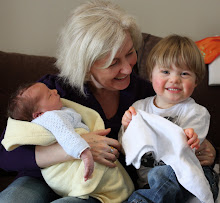But I kept reading… I leave it to you all to judge for yourselves...
“
Down syndrome is a genetic disorder characterized by a triplication of the genetic material on the 21st chromosome. This trisomy occurs with the first division of the developing zygote, as a result there is extra genetic material present in every cell of the individual.
Recently, science has discovered that this cellular abnormality is highly contagious.
As a result, family members (and even friends) of individuals with Down syndrome often find themselves exhibiting dramatic changes due to this "something extra" permeating their bodies at the cellular level.
These changes manifest themselves in a number of ways. Something extra in the visual cortex results in parents who view the world differently.
In addition to seeing things in an entirely new light, these parents also report having an increased ability to focus on what is important.
Spontaneous appearance of tears of joy have also been confirmed. The section of the brain used in logical thought undergoes dramatic changes.
Parents suddenly find themselves able to comprehend and discuss complex medical procedures. The ability to decipher long strings of acronyms appears almost immediately and it is not uncommon for affected parents of newborns to be able to differentiate between ASD,VSD and PDA. Familiarity with G-tubes, Pic lines and the NICU is another side effect.
Over time, the entire nervous system is transformed, enabling parents to perform tasks previously thought impossible. These changes result in individuals finding the nerve to advocate before large crowds, speak to classrooms of medical students and educate the population at large about issues they are passionate about. These changes are closely tied in to dysfunctions in the verbal abilities, which makes it virtually impossible for parents to bite their tongue. Often, individuals who previously considered themselves reserved will find themselves outspoken and effective communicators.
The pulmonary system is altered to a dramatic extent. Parents report having their breath taken away at the slightest prompting. The cardiovascular system develops similar vulnerabilities and reports of hearts pounding loudly and swelling unexpectedly are not uncommon.
One mother reported that her heart skipped a beat when her son smiled at her for the first time.
The extremities are also altered. Arms reach out to strangers for support, and in turn, hands comfort and nurture those in need. Legs strengthen and balance improves, allowing parents to stand firm in their convictions and walk without faltering, even when shouldering a heavy load.
Scientists are baffled by the widespread scope of these symptoms. Equally perplexing is the response of those afflicted. Parents readily acknowledge fundamental changes in their being, however, almost universally declare a preference for their new, altered level of functioning. "I wouldn't change a thing" is a common refrain.
Apparently, the presence of a little "something extra" enhances the lives of individuals fortunate enough to be infected.
Originally written by Wendy Holden (the British journalist…? I am not sure!)
;-)








